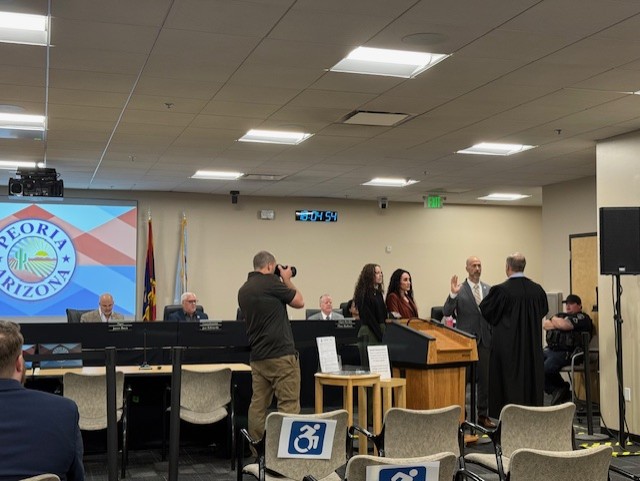
By Maryann Batlle
Cronkite News
The U.S. Supreme Court begins its 2012 term Monday right where it left off the last term – hearing a case from Arizona.
The high court, which heard Arizona’s SB 1070 immigration law this spring as one of its last acts in the 2011 term, is scheduled to hear arguments Oct. 9 on an Arizona death-penalty case.
Arizona has two other cases in the wings, challenging lower court decisions that voided part of the state’s voter registration law and another on benefits for same-sex partners of state workers. And it’s filed papers in support of an Alabama suit challenging federal oversight of some states’ elections procedures under the Voting Rights Act.
That doesn’t even count the likely appeals this year from Arizona death-row inmates of their sentences.
Former Arizona Attorney General Terry Goddard said it is “relatively rare” to have multiple cases before the Supreme Court in the same term. He estimated that during his time as attorney general, from 2003 to 2011, the office averaged about one case a year.
“And I think that’s very high. Whenever you’re talking about multiple cases from one state, it’s very high,” Goddard said.
Toni Massaro, a constitutional law professor at the University of Arizona’s James E. Rogers College of Law, could not say Friday whether Arizona’s caseload this term is unusual. But she said Arizona has taken a “leadership role” before the high court when it comes to states’ rights, the issue that was at the core of the SB 1070 case it argued in April.
“As the federal regulatory reach expands, collisions with state regulatory powers are inevitable,” Massaro said by email.
“It is fair to say that in the revival of interest in state’s rights and less federal power, Arizona is likely in many areas to take a leadership role in advancing states’ rights,” she wrote.
Arizona Attorney General Tom Horne is scheduled to argue the state’s first case before the Supreme Court, Ryan v. Gonzales, on Oct. 9. That case, which has been combined with a similar case from Ohio, will ask whether a death sentence can be indefinitely delayed if courts determine that the condemned man is mentally incompetent to assist in his appeals.
In the realm of states’ rights, Horne’s office has also filed a petition asking Supreme Court to review the 9th U.S. Circuit Court of Appeals decision in a voting-rights case, Arizona v. Inter Tribal Council of Arizona.
The appeals court in that case rejected a section of Arizona’s Proposition 200, a 2004 state law that said people had to show proof of citizenship before they could be registered to vote in the state. The appellate court said that state law is trumped by federal law, the National Voter Registration Act of 1993, which only requires that people attest to the fact that they are citizens when registering.
The Supreme Court briefly blocked that ruling this summer before lifting the stay and letting the decision take effect for this election cycle. Horne appealed and the court is scheduled to discuss next week whether to consider the case or not.
At least one expert on voting rights does not expect the justices to hear the Proposition 200 case.
“It’s unlikely that they’re going to get the Supreme Court to bite on this one,” said Daniel Tokaji, a professor at Ohio State University’s Moritz College of Law and a senior fellow of election law.
Tokaji said the appeals court ruling in the case was “pretty straight-forward.”
“Arizona may not like the federal law, but they have to comply with it,” he said.
The high court has already “conferenced” – or met to decide whether it will hear – the third case from Arizona, Diaz v. Brewer. But it has not yet announced its decision from that conference.
That case deals with a state law that denied health benefits to domestic partners of state employees. A group of homosexual state workers sued, claiming the law violated their equal-protection rights, since heterosexual state employees could marry their partners and get the benefits.
The 9th Circuit agreed in September 2011, saying the law discriminated against gays and was not just an attempt to save money as the state claimed.
Whether it takes up Diaz or not, most expect the Supreme Court will take up the larger issue of gay marriage this term. Arizona, which is one of the states with a constitutional ban on same-sex marriages, could be affected by any ruling in that regard.
Goddard said there are no guarantees that a state will get a case before the Supreme Court. It can depend on the size of the state and other factors in a particular term, but that “much of it is sort of circumstances and luck of the draw.”
In 2009, for example, his office had two search-and-seizure cases before the Supreme Court – one in November and another in December. Goddard said it’s hard to explain how that can happen because every case is different and some attorneys general never get a chance.
He thinks the way arguments are framed and the level of expertise from individual attorneys can make a difference. And, he said, it doesn’t hurt to ask.
“We are very active litigants in Arizona,” Goddard noted.
Arizona in the Supreme Court
The U.S. Supreme Court has already agreed to hear one case from Arizona this term and the state is asking it to consider appeals of at least two more. The cases are:
• Ryan v. Gonzales: Can an indigent death-row inmate indefinitely delay imposition of sentence if he is not mentally competent to assist his attorneys in his defense?
Scheduled for hearing on Oct. 9
• Diaz v. Brewer: Did the state violate the Constitution’s equal protection clause by offering healthcare benefits to spouses and children of state employees but denying them to the domestic partners of state workers?
“Conferenced” by the court, no announcement yet on whether the justices will hear the case.
• Arizona v. the Inter Tribal Council of Arizona Inc.: Did the appeals court incorrectly hold that the National Voter Registration Act, which does not require proof of citizenship for voter registration, trumps a state law that does?
Scheduled to be conferenced on Oct. 5.
Additionally, the high court has already been presented with one death row case from Arizona:
• Ryan v. James: Did an appeals court wrongly reverse lower-court rulings that had denied a death-row inmate’s claims that his attorney for his sentencing as “grossly ineffective”?
Scheduled to be conferenced on Oct. 12.






